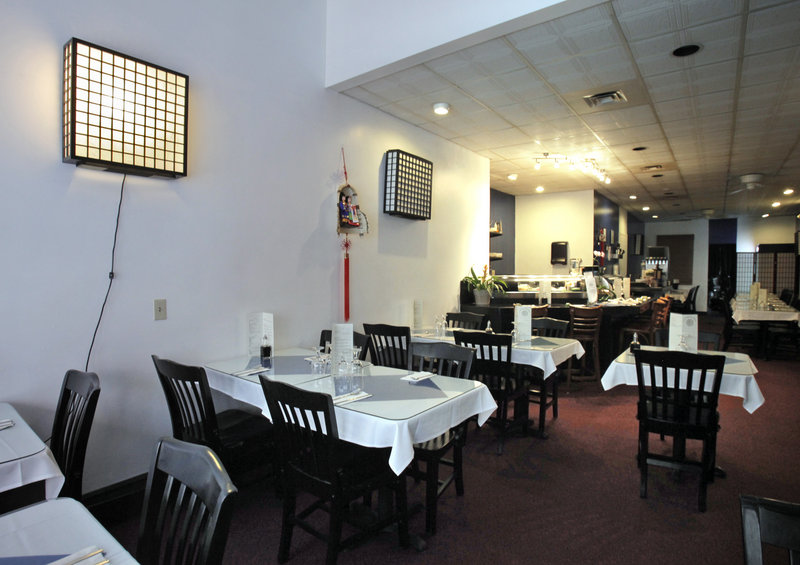Korean food is making inroads in Portland, winning devotees to its seafood dishes and soup. Little Seoul, which hedges its bets by offering customers teriyaki, sushi and specialty maki, cooks Korean cuisine to a T, at least when it comes to stir-fried octopus. In fact, as an American novelist wrote about one of his characters, that Nak-ji Bokum ($14.50) has a spark of the sacred fire.
It might make your eyes water a bit too, in a good way.
Octopus is tricky to cook. Cooked too much, it’s rubbery, but it will become tender again if you commit to an hour of braising. The cook managed the stir-fry just right on one recent night, cooking the chopped tentacles “barely and briefly” to achieve the tender yet chewy texture that makes them so good.
Of course there is a lot going on in the kitchen, and a sushi bar provides items I had no opportunity to sample. But although from necessity and for budgetary reasons I taste only small samples of menus, I would certainly recommend greater explorations of the dishes at Little Seoul. The smooth, strong heat of spicy Korean food is a wonderful thing in the winter in Maine.
No doubt the pancake ($12.50), made with seafood and vegetables, would be good to try, and the Yook-gae-jang or shredded beef in a spicy broth ($14) would be too. Adventurous folks will try the beef “tripas” (tripe) and vegetables in the Gop-chang Bokum ($18.50); the Pork on Fire ($8), an appetizer made with pork belly; or the spicy sea snail salad ($6).
Another appetizing menu item is the Jang-uh-durp-bop ($11.50), a bowl of rice topped with broiled eel, seaweed, ginger, sesame seeds and house eel sauce.
“We get eels from one of the Japanese companies in Boston. They’re already cooked,” said restaurant manager Younji Kim. The eel sauce contains eel broth, soy sauce and sugar. Kim’s mother, Insook Kim, is the chef and owner, and knows Korean dishes intimately, having emigrated from Korea with her family five years ago.
The austere dining room, with deep blue and white walls, squares of white-paper-shaded lights set inside a lattice of black wood and bare wood tables, holds a tranquil atmosphere.
Calm and self-possessed, the sushi chef regards his customers with careful attention. The server was knowledgeable, bringing back details about the oyster sauce that came with fried oysters ($7.50).
Robed in golden, crispy shards of panko, those oysters were respectable but not as good as they could have been — perhaps cooked just a shade too long. The thick, dipping sauce was redolent of anchovy and salt.
A bowl of dumpling soup ($3.50) was filled with thin chicken broth and skinny slices of fresh mushroom. The dumplings were soft, and the pork inside was suitably flavored with sharp ginger.
Cloudy, tangy miso soup came with the Korean entree, flecked with seaweed, a pleasing version of the standard we have all come to expect.
Little dishes of kim chee, in this case pickled cucumber, pickled bean sprouts and pickled Napa cabbage, are part of a meal that includes Korean food. The crunchy vegetables with chili paste are mildly spicy and tart, refreshing your taste buds for another bite of whatever else is in front of you.
Usually, kim-chee served here takes about a month to ferment, Younji Kim said, and of course, it is all made here.
The wine list is short, with 14 Hands Merlot among the few red wines and a Nigori sake, creamy and sweet, among the rice wines. Now and Zen ($7), an Alsatian white, is fiercely scented with grapefruit. Once I got my metal chopsticks into the octopus stir-fry, though, the grapefruit reek vanished, and I was just grateful for a cold, acidic wine to calm down my mouth.
Little Seoul’s wide range of selections makes it possible for those of us who want to eat Korean to persuade your friends to come along, even if they don’t.
They might want to eat the Yaki Udon ($11.50) with its big, fat rice noodles and savory sauce, though maybe the tofu isn’t the way to go — since our version held tofu fried into dry cubes that were chewier than the octopus. Chicken, beef, shrimp and pork are other options. Tempura ($14 with shrimp and vegetables, $11.50 with squid and vegetables, $10.50 for vegetables only) is another lure.
But my eyes are drawn back to the Korean specialties like Bi-bim-bop ($13): rice with beef, vegetables and seaweed, served in a hot bowl.
Fried ice cream comes with green tea, ginger and vanilla flavors ($6). Mochi ice cream comes in green tea, red bean and vanilla ($5). Banana spring rolls with caramel and vanilla ice cream ($7.50) might be the carrot that gets the kids to join you, so you can enjoy this welcome opportunity to taste what Northerners across the Pacific cook to keep themselves warm.
N.L. English is a Portland freelance writer and the author of “Chow Maine: The Best Restaurants, Cafes, Lobster Shacks and Markets on the Coast.” Visit English’s website, www.chowmaineguide.com.
Send questions/comments to the editors.



Success. Please wait for the page to reload. If the page does not reload within 5 seconds, please refresh the page.
Enter your email and password to access comments.
Hi, to comment on stories you must . This profile is in addition to your subscription and website login.
Already have a commenting profile? .
Invalid username/password.
Please check your email to confirm and complete your registration.
Only subscribers are eligible to post comments. Please subscribe or login first for digital access. Here’s why.
Use the form below to reset your password. When you've submitted your account email, we will send an email with a reset code.